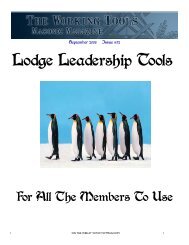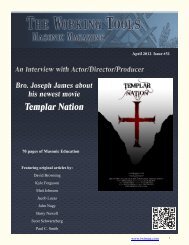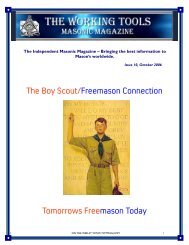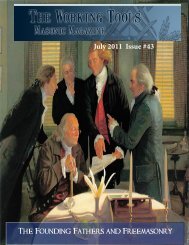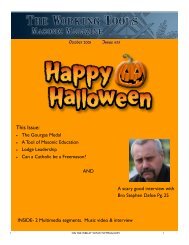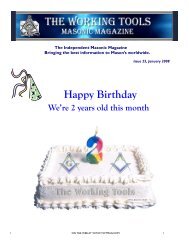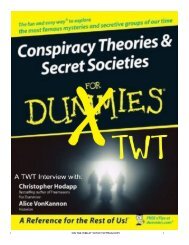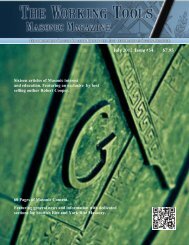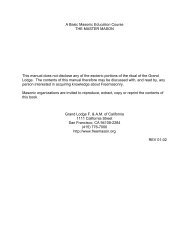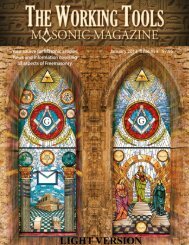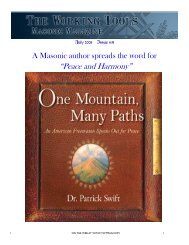The Working Tools Magazine âLightâ Version - Hawthorne-Fortitude ...
The Working Tools Magazine âLightâ Version - Hawthorne-Fortitude ...
The Working Tools Magazine âLightâ Version - Hawthorne-Fortitude ...
You also want an ePaper? Increase the reach of your titles
YUMPU automatically turns print PDFs into web optimized ePapers that Google loves.
“Freemasonry: A Better Way Of Being”<br />
By:<br />
Michael H. Shirley, PM & Todd E. Creason, PM<br />
"Freemasonry is kindness in the home;<br />
honesty in business; courtesy toward others;<br />
dependability in one's work; compassion for<br />
the unfortunate; resistance to evil; help for<br />
the weak; concern for good government;<br />
support for public education; and above all, a<br />
life-practicing reverence for God and love of<br />
fellow man."<br />
In our first piece, “<strong>The</strong> Craft in Thirty Seconds”, which was<br />
published in the September issue, we discussed how important it<br />
is for every Freemason to have a thirty-second elevator<br />
conversation ready, when that inevitable question “What is<br />
Freemasonry?” was presented to us. We wanted to talk about it,<br />
because it’s not something Freemasons discuss very much—the<br />
fact that we are each representative of the Craft of Freemasonry is<br />
not something most Freemasons think about very much. But we<br />
should all be prepared to answer that question meaningfully when<br />
we’re asked.<br />
It might be a new idea in our more modern world, but it’s not a<br />
new concept. If we look at the example provided by one of the<br />
most famous American Freemasons, George Washington. <strong>The</strong><br />
George Washington Masonic Memorial in Alexandria Virginia<br />
proposes, in concert with its presentation of Washington the man<br />
and Mason, the definition of Freemasonry quoted above. It<br />
applied to Freemasonry in Washington’s time. <strong>The</strong> implication of<br />
the monument and the words is that Freemasonry is timeless. Is<br />
it? Does this definition apply today as it did more than two<br />
centuries ago?<br />
Let’s have a look at this definition, one piece at a time, and see if<br />
we can find a satisfactory answer.<br />
Freemasonry is kindness in the home . . .<br />
An archaic definition of “kindness,” which George Washington<br />
would have understood, is “affection.” And this most magisterial<br />
American aristocrat was affectionate in his home, with his wife,<br />
his stepchildren, and their children. Affection is marked by a true<br />
concern for others, and an unfailing wish for their best interests in<br />
all things. As our families take up so much of our time, it’s easy<br />
to get frustrated at their demands, and to want to get away. But<br />
we are away often enough, as Washington was when called to his<br />
duty. Our duty calls us to embrace our families with true<br />
affection, to cultivate kindness in a way that can never be archaic.<br />
And it’s never been more difficult to raise a family than it is<br />
today. <strong>The</strong>re are so many distractions. Families today can all live<br />
under one roof and still not be together as a family. <strong>The</strong>re is<br />
By television, featured iPods, TWT computers, writer Kyle video Ferguson games, email, school,<br />
activities, and a constant barrage of text messages. While we all<br />
live together under one roof,<br />
very often we’re living our<br />
own lives and interacting<br />
with the world in ways<br />
Washington would have<br />
never dreamed possible.<br />
Getting together for<br />
something as basic as a<br />
family meal is often nearly impossible. Kindness in the home<br />
requires a connection, and today, we often fail at that.<br />
Freemasonry, as time consuming as it can be, requires us to<br />
remember that our family is our priority, and reminds us to devote<br />
our time and attention to them. A life Masonically lived requires<br />
an affectionate connection, well tended, with those we love.<br />
. . . honesty in business . . .<br />
In George Washington’s day, a man’s word was his bond, and his<br />
livelihood often depended upon whether he could be trusted to do<br />
the things he promised. Character was king, and respect was<br />
earned through a man’s actions. We live in a very different world<br />
today, in which shortcuts and getting ahead at the expense of<br />
others are seen by too many as being “smart practice.” But as<br />
Freemasons, we strive to be men of honor, for whom a handshake<br />
is a contract. Our word must be our bond.<br />
. . . courtesy toward others . . .<br />
In the eighteenth century, courtesy was a given. People acted<br />
toward one another with a ritualistic politeness that made the<br />
functioning of society possible. In today’s world of Internet flame<br />
wars and 24-7 reality yell fests, that world seems lost. But it need<br />
not be. Freemasonry teaches us to act with respect toward other<br />
people, both in lodge and out. That we meet on the level and part<br />
upon the square is assumed in our ritual, and our ritual informs<br />
our practice in our daily lives. When we meet someone, whether<br />
he is a Mason is immaterial to our conduct toward him. He is our<br />
equal in the sight of God, and we must treat him as such in all<br />
circumstances. He is as beloved of God as we are, and if we<br />
would imitate God, as the Craft calls us to do, we ought to start<br />
from a position of love and respect, which is necessary for real<br />
courtesy.<br />
. . . dependability in one's work . . .<br />
A craftsman who was not dependable was not likely to make it in<br />
George Washington’s era. In the world we live in, a “come in<br />
late, take a long lunch, and leave early” mentality isn’t<br />
uncommon. Just finding a contractor who will return a phone call<br />
can be a challenge. As Masons, when we set out to work, whether<br />
we are teachers or plumbers or bankers, we are representing to the<br />
world that we will show up, work hard, and do what we say we<br />
will. Our ritual teaches the possibility of perfection, which we<br />
will never reach. But we may dependably get closer to it if we<br />
work as Masons. (Continued on page 12)<br />
11 www.twtmag.com



